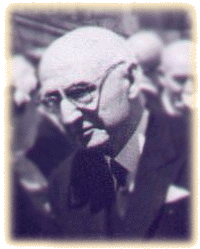|
|


|
 |
 |
 |
A descendant of the March family has discovered 10 unpublished books written by Joan March
 All sorts of myths have grown up around the famous Mallorcan financier Joan March Ordinas
to the point of making him into a sort of legend. All sorts of myths have grown up around the famous Mallorcan financier Joan March Ordinas
to the point of making him into a sort of legend.
Many people believe that he came from a humble family and that his immense fortune came from nowhere. When he
died in 1962 he was the seventh richest man in the world. All this is completely false, and it has been confirmed
for first time in history how the magnate began in business.
At the beginning of September 2001 a descendant of the March family, Miquel Monjo Estelrich, great grandson of Rosa
March Ordinals, sister of the financier, found 10 books of accounting belonging to the March family. Miquel Monjo is one
of the owners of the country house where Joan March lived for eleven years, from 1905 (when he married Elionor Servera Melis)
until 1916, when he left Santa Margalida (Mallorca, Spain) the town of his birth, and to which he apparently never returned.
The books were safe inside a big room, located on the third and top floor of the house. On the cover it said "1895". It should
be noted that many of these books were written by Joan March Ordinals himself, and due to this discovery, a set of previously
unpublished documents relating to this extraordinary and controversial character can be studied in detail.
The discovery of these books has created great interest especially following publication in the press of much of their contents,
because these books reveal smuggling of tobacco and the bribery and corruption of the State Security Forces.
The March Company had three partners; Joan March Rosello, Joan and Sebastian March Estelrich (grandfather, father, and uncle of
the financier Joan March Ordinals).
The company was founded in 1805 and continued working until 1905. The books of accounts found correspond to this period. The
documents record in great detail the economic transactions of the March Company in their entirety. Initially it was devoted
to the sale and purchase of cereals, garlic and pigs, their major export, but later they expanded activities to incorporate a
tobacco business.
Various historians, including Carles Manera, Professor of Economic History at the University of the Balearics (UIB), have seen
the books and have authenticated the "discovery of exceptional historical value". So much so, that they will be forced to revise
the biographies that have been written about the financier.
Professor Manera identifies three important aspects which demonstrate the value of the account books found:
- that the majority were handwritten by March himself;
- that for first time it will be possible to quantify the price of corruption at the time, as the books detail payments to the public guards;
- and that they can study the documentary evidence related to the economic activity in the agricultural sector during the first
half of the 20th Century in Mallorca.
|
|
|

